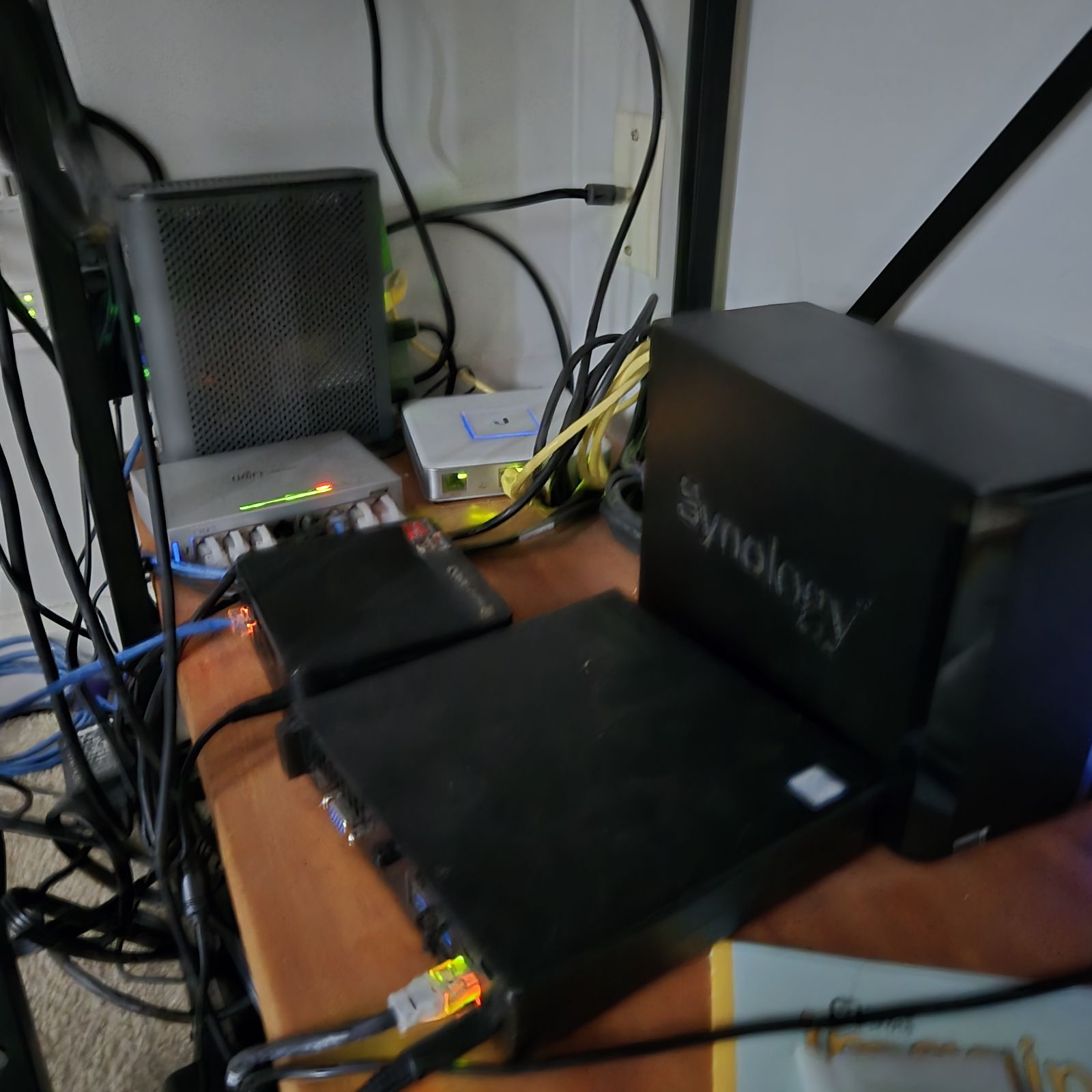Used it for Minecraft server for a week then never used it again. Don't know anything it would be good for that my computer can't already do better tbh
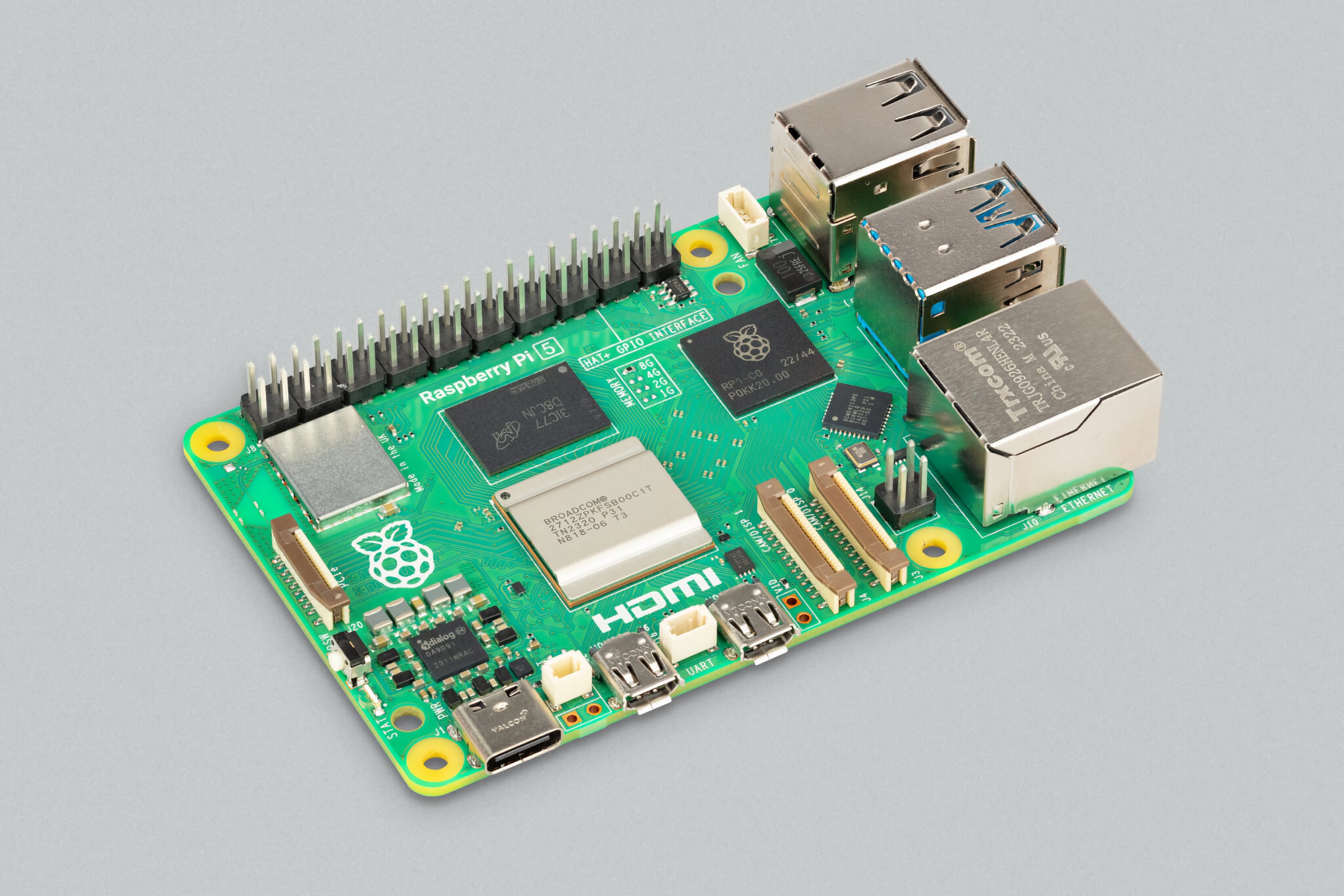
A place to share alternatives to popular online services that can be self-hosted without giving up privacy or locking you into a service you don't control.
Rules:
Be civil: we're here to support and learn from one another. Insults won't be tolerated. Flame wars are frowned upon.
No spam posting.
Posts have to be centered around self-hosting. There are other communities for discussing hardware or home computing. If it's not obvious why your post topic revolves around selfhosting, please include details to make it clear.
Don't duplicate the full text of your blog or github here. Just post the link for folks to click.
Submission headline should match the article title (don’t cherry-pick information from the title to fit your agenda).
No trolling.
Resources:
Any issues on the community? Report it using the report flag.
Questions? DM the mods!
Used it for Minecraft server for a week then never used it again. Don't know anything it would be good for that my computer can't already do better tbh


Testing an image post from Voyager client...
I only own the gear marked A and B, which lives above the couch I call home.
A is my web services 24/7 Proxmox box, an Intel 8500T; 2 routers; an 8TB HDD; and a Back-UPS Pro so old its ethernet surge protection is rated for 100bT, with a brand new LFP battery in it. The UPS powers both A and B.
B is my personal Proxmox box, an AMD 5750GE, which I use for development and running desktop OSes which I remote into, plus a GL.iNet Slate AX router. These come with me if I stay someplace other than the couch (not pictured). That's why they're on different shelves. Also, there's a USB wifi dongle w/antenna connected to B which I used when some stupid website demands I drop my VPN (all traffic from everything pictured is routed thru 24/7 private VPN endpoints, aka a $2/mo VPS or three).
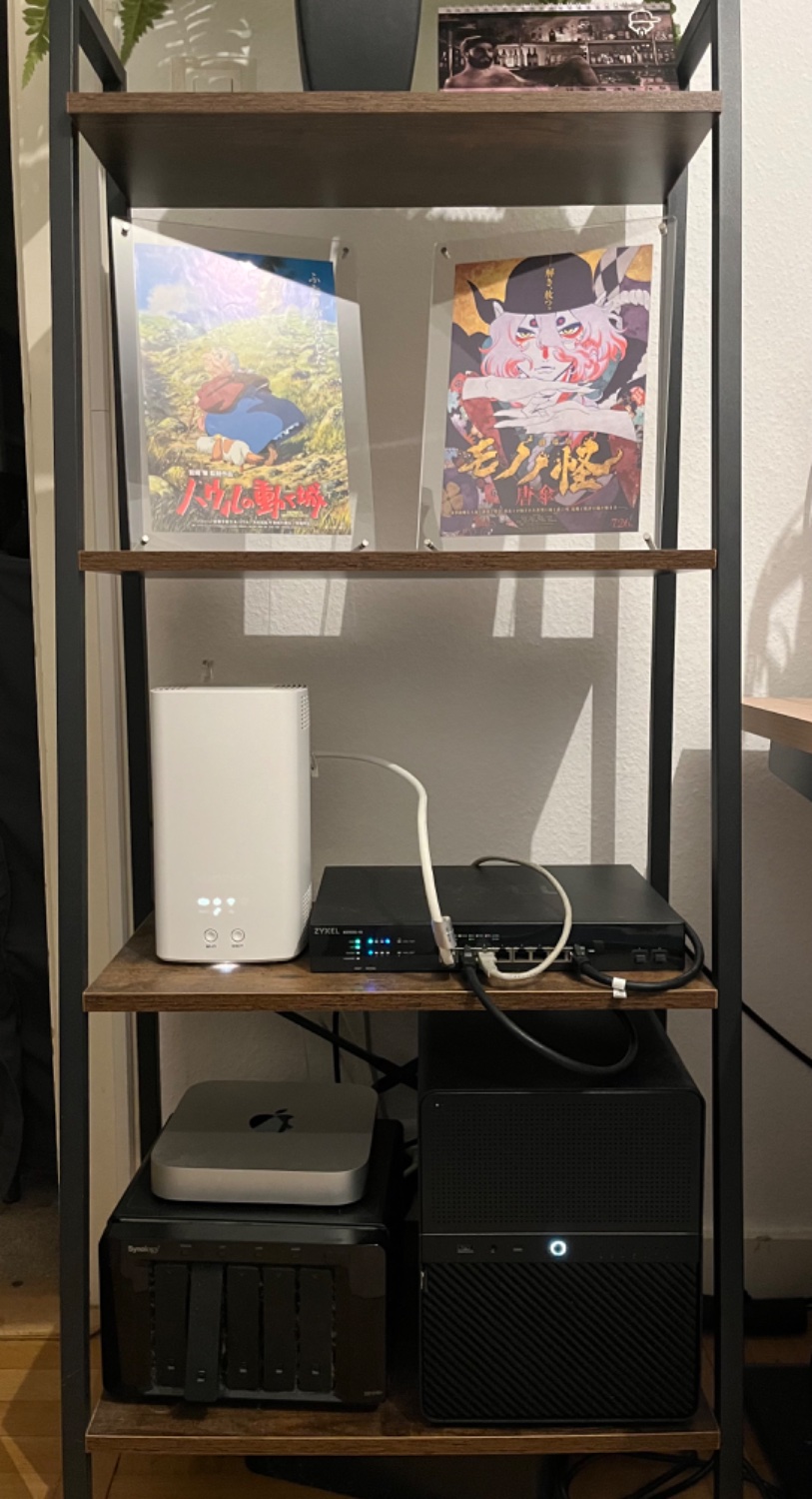
A simple homemade NAS, mostly for hosting my Plex library, VPN+torrent and cloud.
The synology needs to be emptied, removed and sold.
The m2 Mac mini was hosting some docker like pihole and actual budget but those are now on another Mac mini used as a workstation, so this one will be sold as well.

The disks are the most uggo part. They’re a bunch of old disks of varying sizes with a RAID+LVM setup to make the most use of them while still being redundant.
lsblk output of the whole thing
saiko@vineta ~ % lsblk
NAME MAJ:MIN RM SIZE RO TYPE MOUNTPOINTS
sda 8:0 0 111.8G 0 disk
├─sda1 8:1 0 512M 0 part /Volumes/Boot
└─sda2 8:2 0 111.3G 0 part /nix/store
/
sdb 8:16 1 372.6G 0 disk
└─sdb1 8:17 1 372.6G 0 part
└─md1 9:1 0 1.5T 0 raid5
└─storagevg-storage 254:0 0 6.3T 0 lvm /Volumes/storage
sdc 8:32 1 465.8G 0 disk
├─sdc1 8:33 1 372.6G 0 part
│ └─md1 9:1 0 1.5T 0 raid5
│ └─storagevg-storage 254:0 0 6.3T 0 lvm /Volumes/storage
└─sdc2 8:34 1 93.1G 0 part
└─md2 9:2 0 279.3G 0 raid5
└─storagevg-storage 254:0 0 6.3T 0 lvm /Volumes/storage
sdd 8:48 1 4.5T 0 disk
├─sdd1 8:49 1 372.6G 0 part
│ └─md1 9:1 0 1.5T 0 raid5
│ └─storagevg-storage 254:0 0 6.3T 0 lvm /Volumes/storage
├─sdd2 8:50 1 93.1G 0 part
│ └─md2 9:2 0 279.3G 0 raid5
│ └─storagevg-storage 254:0 0 6.3T 0 lvm /Volumes/storage
├─sdd3 8:51 1 465.8G 0 part
│ └─md3 9:3 0 931.3G 0 raid5
│ └─storagevg-storage 254:0 0 6.3T 0 lvm /Volumes/storage
└─sdd4 8:52 1 3.6T 0 part
└─md4 9:4 0 3.6T 0 raid1
└─storagevg-storage 254:0 0 6.3T 0 lvm /Volumes/storage
sde 8:64 1 7.3T 0 disk
├─sde1 8:65 1 372.6G 0 part
│ └─md1 9:1 0 1.5T 0 raid5
│ └─storagevg-storage 254:0 0 6.3T 0 lvm /Volumes/storage
├─sde2 8:66 1 93.1G 0 part
│ └─md2 9:2 0 279.3G 0 raid5
│ └─storagevg-storage 254:0 0 6.3T 0 lvm /Volumes/storage
├─sde3 8:67 1 465.8G 0 part
│ └─md3 9:3 0 931.3G 0 raid5
│ └─storagevg-storage 254:0 0 6.3T 0 lvm /Volumes/storage
└─sde4 8:68 1 3.6T 0 part
└─md4 9:4 0 3.6T 0 raid1
└─storagevg-storage 254:0 0 6.3T 0 lvm /Volumes/storage
sdf 8:80 1 931.5G 0 disk
├─sdf1 8:81 1 372.6G 0 part
│ └─md1 9:1 0 1.5T 0 raid5
│ └─storagevg-storage 254:0 0 6.3T 0 lvm /Volumes/storage
├─sdf2 8:82 1 93.1G 0 part
│ └─md2 9:2 0 279.3G 0 raid5
│ └─storagevg-storage 254:0 0 6.3T 0 lvm /Volumes/storage
└─sdf3 8:83 1 465.8G 0 part
└─md3 9:3 0 931.3G 0 raid5
└─storagevg-storage 254:0 0 6.3T 0 lvm /Volumes/storage
sr0 11:0 1 1024M 0 rom
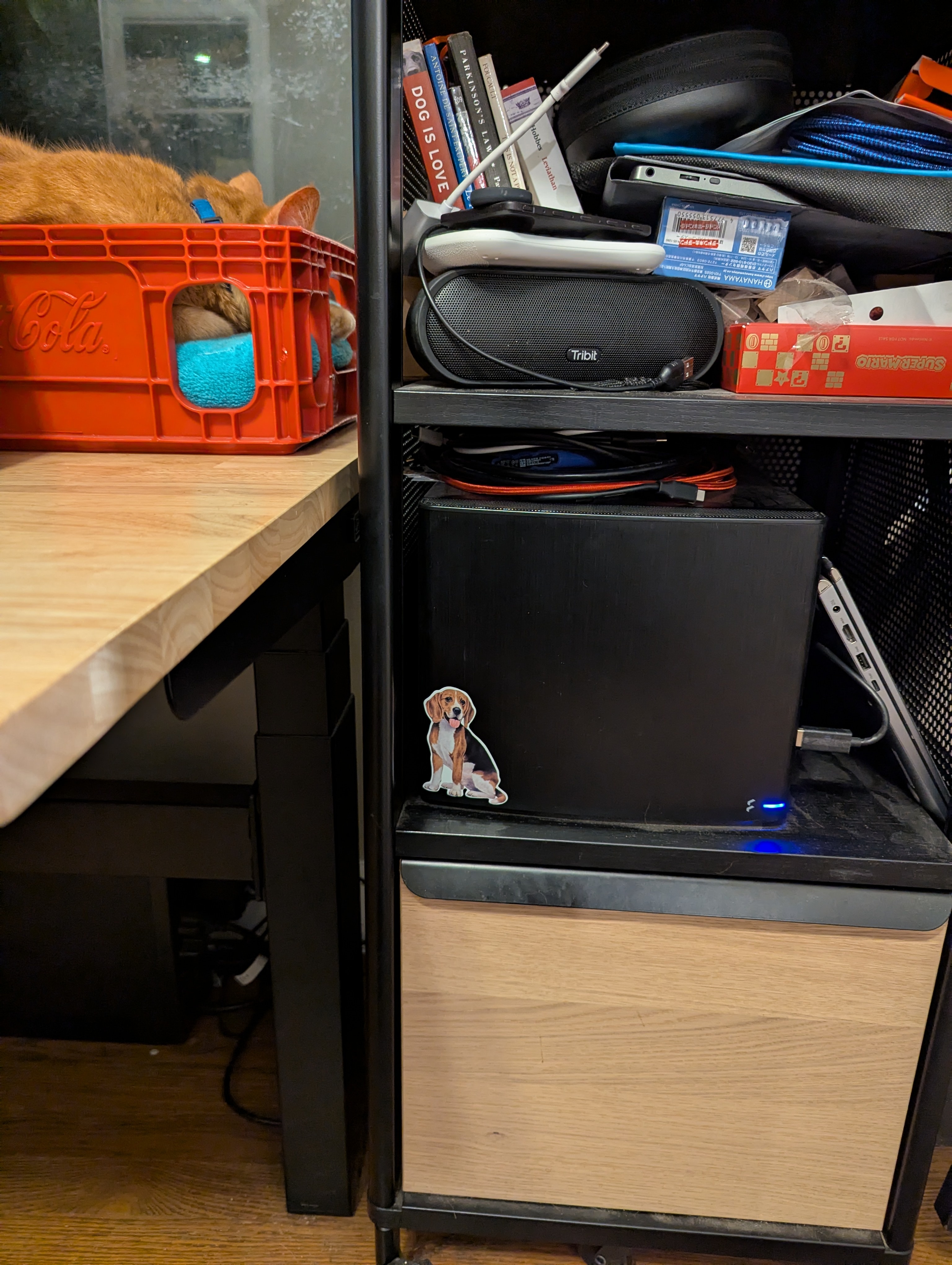
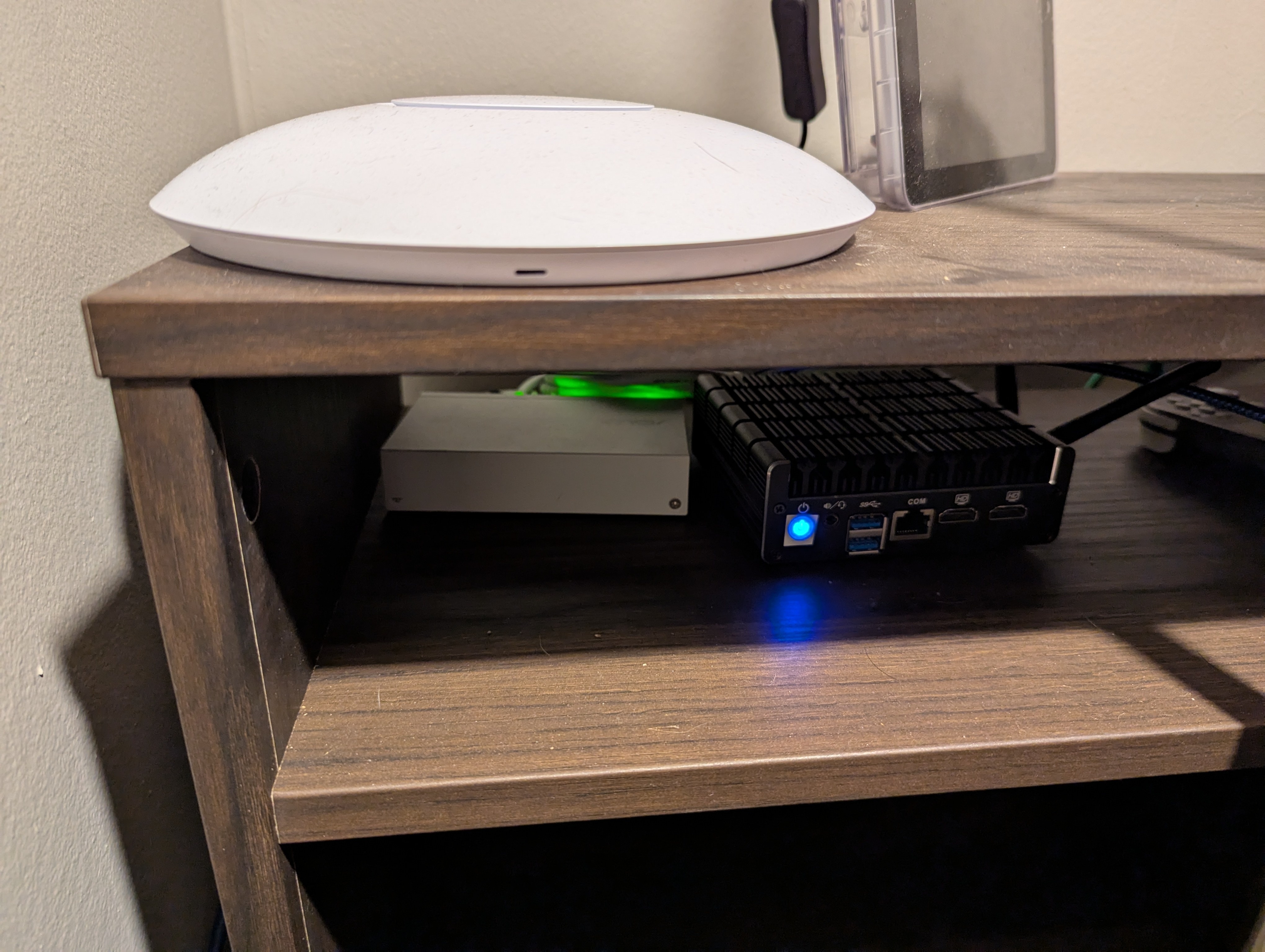
Running TrueNAS with 4TB usable mirrored storage, 32GB RAM, and an i5-7600. Mostly holds backed up files from my switch from Windows to NixOS. I've got it running Frigate with a Coral TPU, Gitea, Homer, Unifi Controller, and Uptime Kuma. I was managing some helm charts on the TrueNAS k3s cluster with flux but conveniently dialed back to only using their built-in apps right before they removed it in favor of docker only.
For the network I'm running OPNSense on a Protectli device with Ubiquiti Unifi for the wifi. The native WireGuard integration on OPNSense is pretty nice.
So mines a weird hodge-podge of a HP Proliant (running my modded Minecraft server and Plex) under a bistro table that I use as a standup desk. A HP Thinclient that I run lighter services like my Pi-Hole and Homebridge. and a laptop
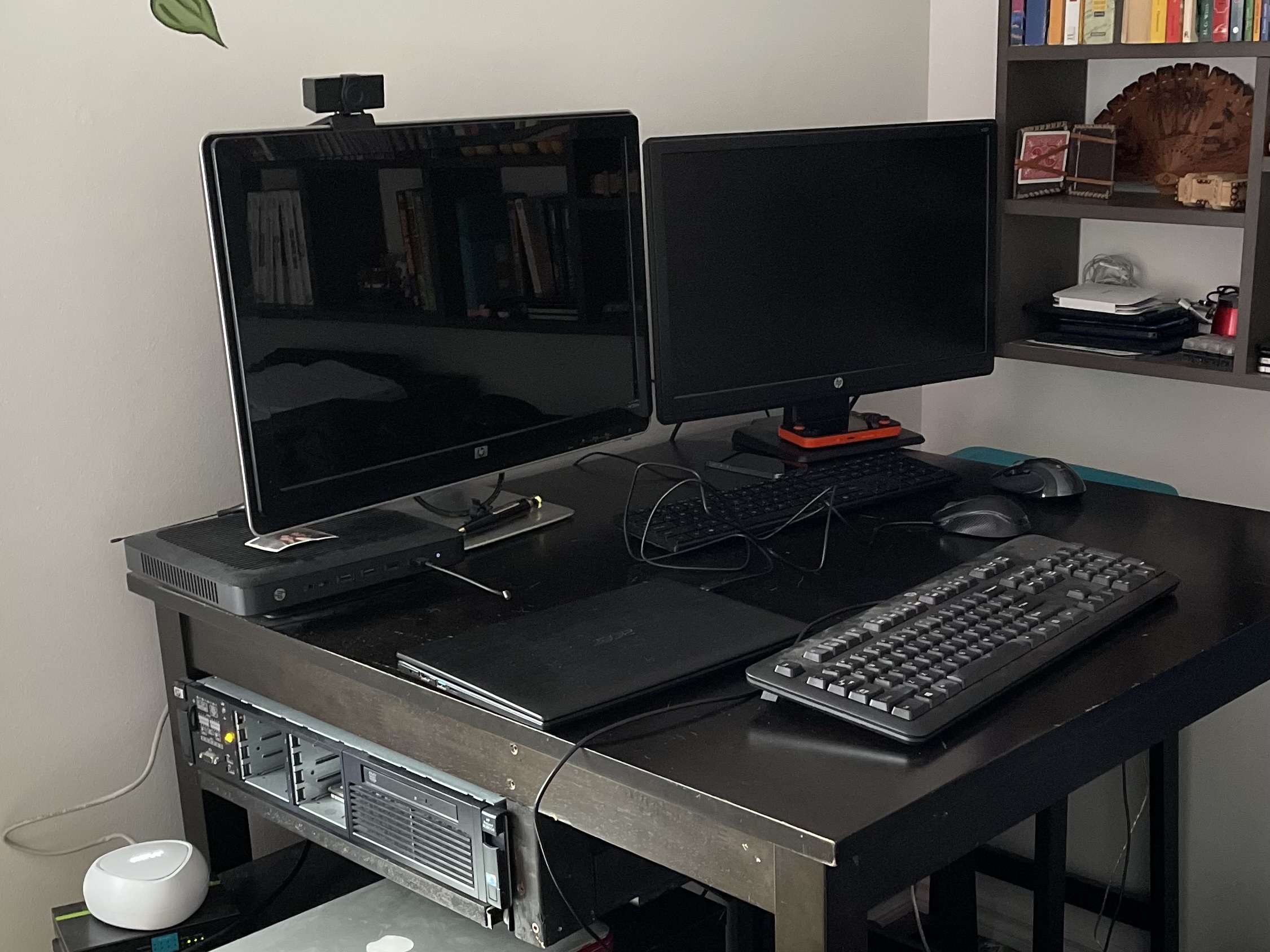
The small board you can see is a pi hole
I do have more tech elsewhere but this pile is comically ugly
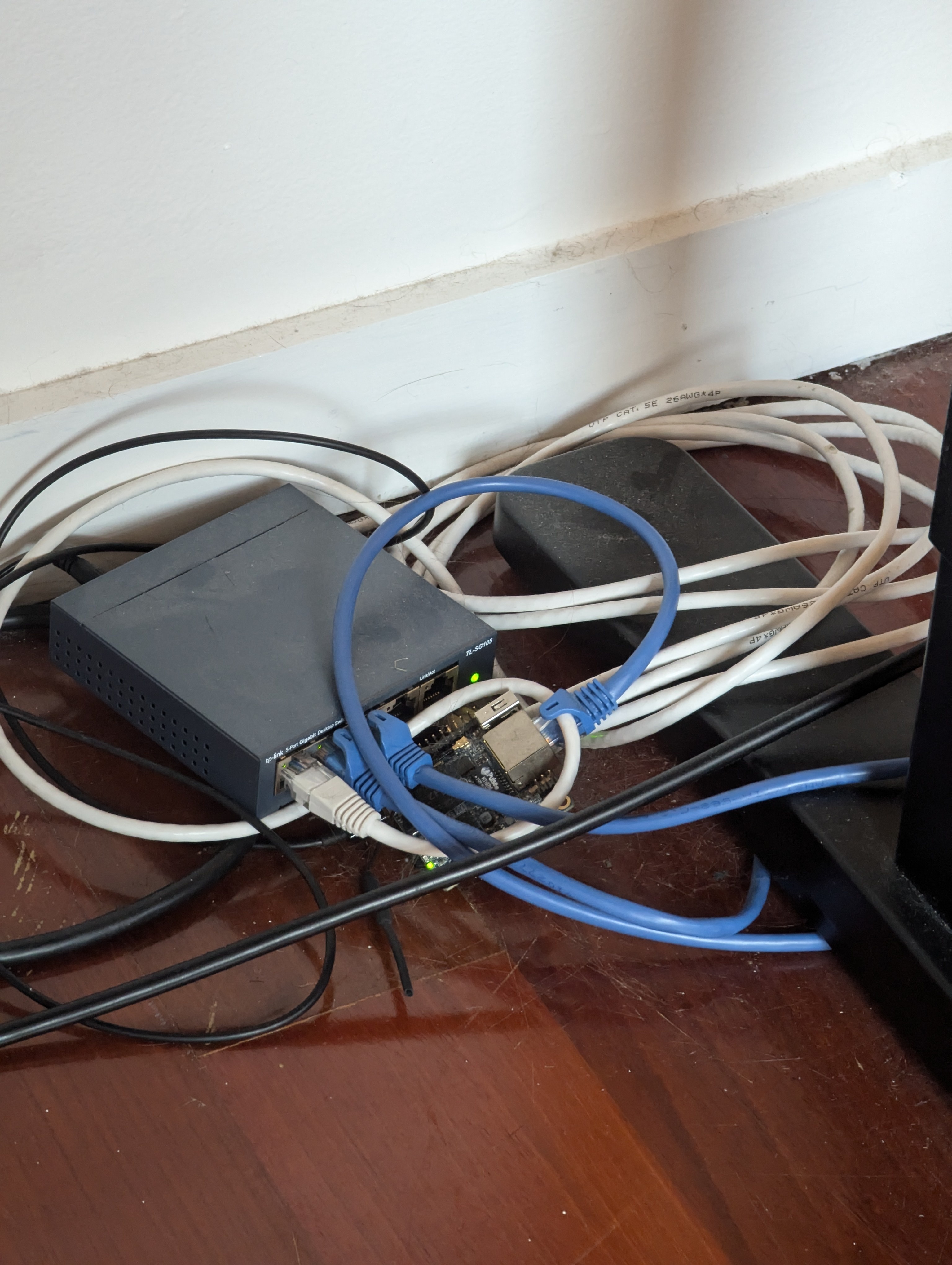
Mines nothing special, i5 10400 with 16GB of RAM and a 1050ti for video encoding. System runs TrueNAS Scale for Plex and Immich and has 44TB of drives running through a Dell H310 PERC SAS card. I desperately need more storage but I've been lacking the funds for new drives, I'd also need a 5.25" drive bay converter to hold the 2 additional drives I need in this case since all the bays are full, and another SAS card since this one's used up.
I'd like to move to Jellyfin but from what I've read it doesn't do as well for streaming from outside the network compared to Plex and half the users of my server are outside my network. So it works for now.
Also have a Raspberry Pi 5 running PiHole
Also a buddy 3D printed a fan mount for the H310 to make sure it doesnt overheat when doing file transfers and I slapped a Noctua on it

Iteration one, the original https://drkt.eu/library/Museum/old_website_hw.jpg
Iteration two, taking it seriously https://drkt.eu/library/Museum/ye_olde_server-rack.jpg
Iteration three, evolved LACK rack https://drkt.eu/library/Museum/new_apartment.jpg
Bonus https://drkt.eu/library/Museum/backside_mess.jpg
'Artemis' Server
MOBO : GigaByte MB GA-Z170XP-SLI
CPU : Intel Core i5 6600K 4c/4t
RAM : 2x DDR4 8GB CL14 2133 Kingston HyperX
PSU : ## TO BE ADDED ##
Storage - SATA : SSD 2TB
- SATA : HDD 4TB
- SATA : SSD 1TB
'Deimos' Server
MOBO : ASRock H81M-ITX
CPU : Intel Pentium G3220 2c/2t
RAM : 2x DDR3 8GB C8 1600 Crucial Ballistix OC
PSU : ## TO BE ADDED ##
Storage - SATA : HDD 300GB
'Phobos' Server
MOBO : Intel H81 Express Chipset
CPU : Intel Core i3 4330T 2c/4t
RAM : 2x DDR3 4GB 1333
PSU : 65 watts AC/DC adapter
Storage - SATA : SSD 2TB
Damn, that's actually pretty sexy for a fresh-air rack How's the noise levels?
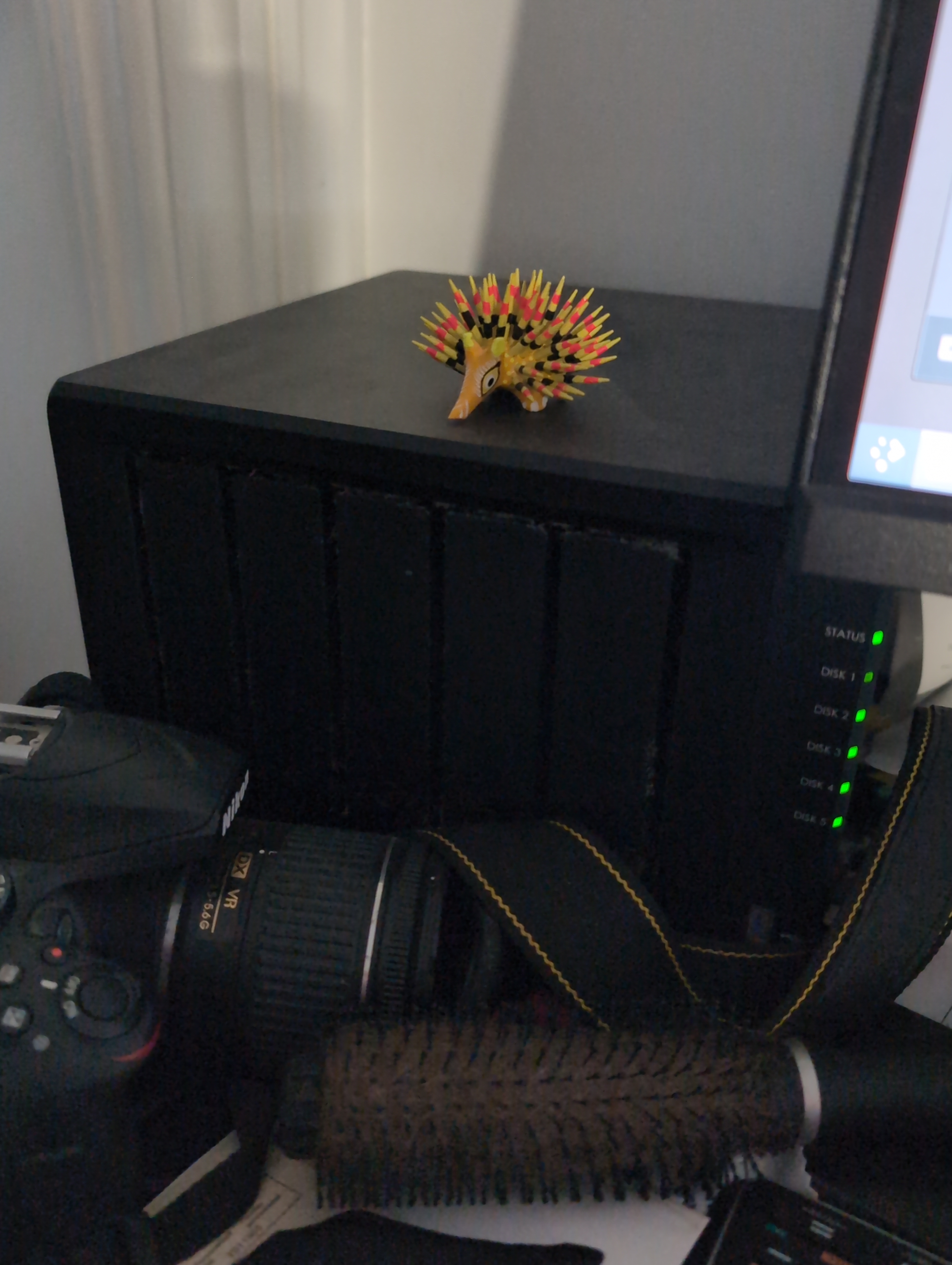
Synology NAS running media server + live document editing server + seedbox. Plans to eventually build a proper server for it. Can't wait until my setup looks like the rest of yours.
The alebrije on top protects from bad torrents (only linux isos :v) and viruses.
Can't but join in the fun. Meet the Egg Mini. Does all sorts of humble servitude, but the coolest thing is a webserver only accessible via Wireguard through HAproxy running on a Digital Ocean droplet.
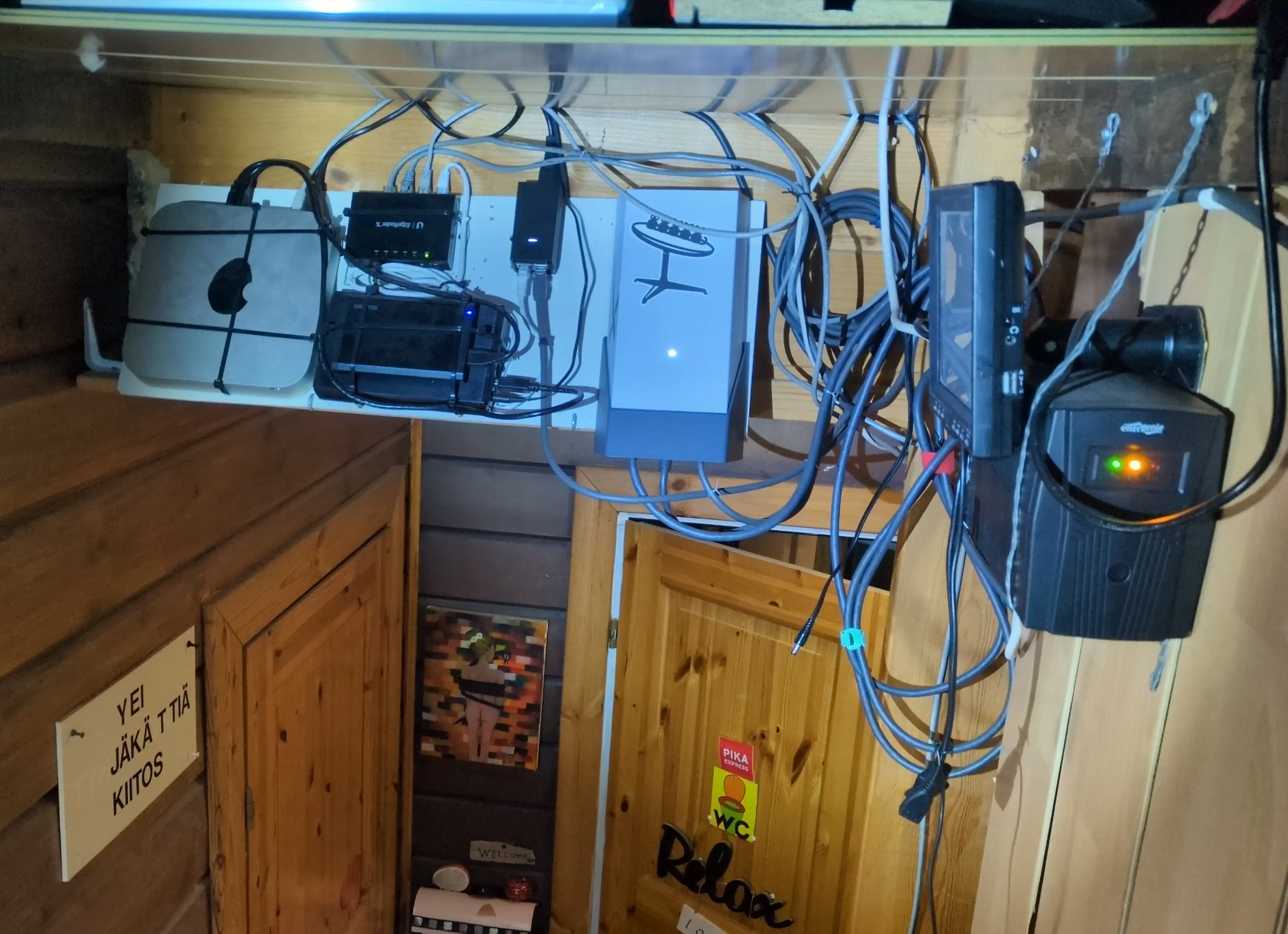
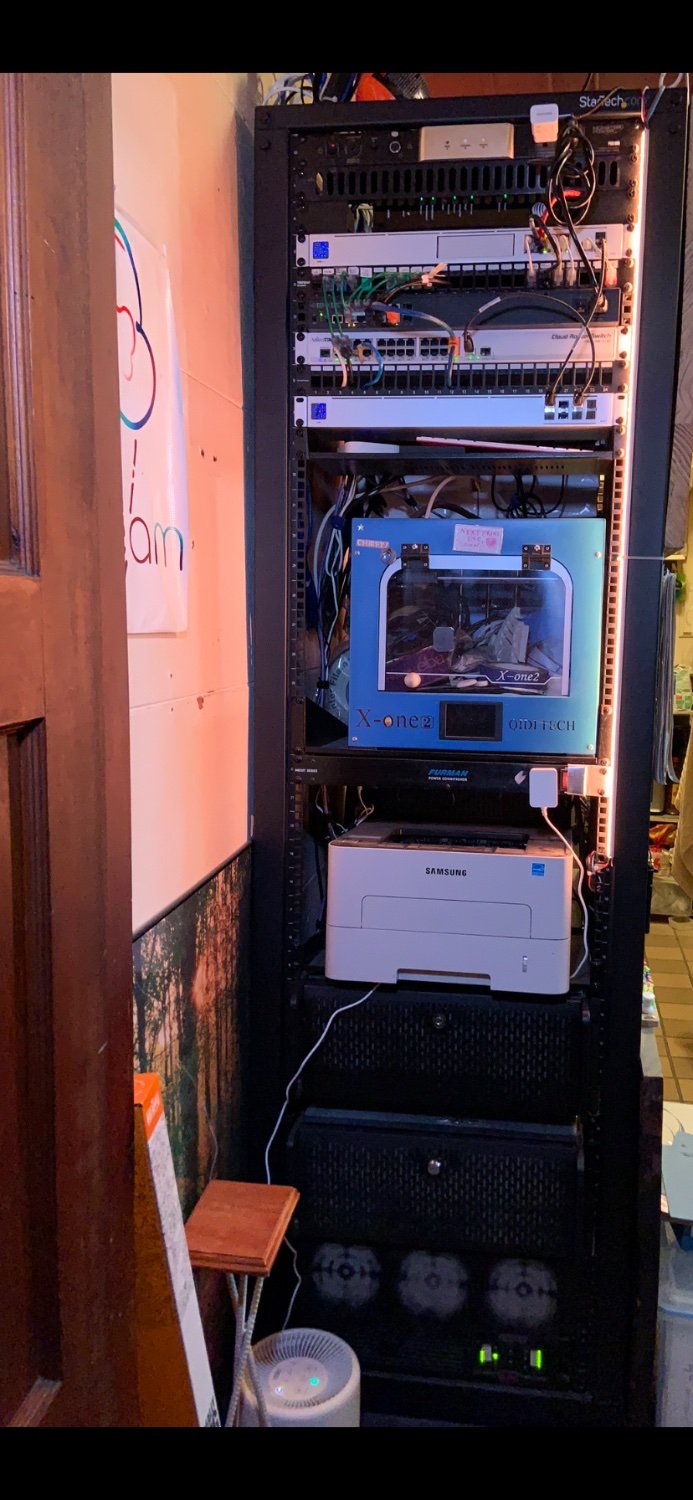
I’m in the middle of moving so everything is packed up. But this was the rack before we moved.
Networking, 3D printer, black and white laser printer and a color laser printer, several servers.
I had home assistant, Plex, Minecraft server, 7 days to die server, and many other services.
Servers are Ryzen 5950x and the other is a threadripper 24 core.
The other side of the rack was HDMI switchers and some game consoles.
Going to miss the 1gbps fiber internet, we now have Starlink.
My dirty data diddler. 10+ yr old amd octacore black running at 4ghz. 4TB of writeable space in it. HD and SSD mix. Old sb xfi audio running to a BT5.0 USB dongle for my games and music. Pioneer CD/DVD writer. Yes I still burn CDs and DVDs for my music and backup purposes heh. White cable on the right hanging vertical is a USBC data/charging cable. The squirrely wires lefttoright are a power line for a digital clock I'm gonna hang on the wall soon.
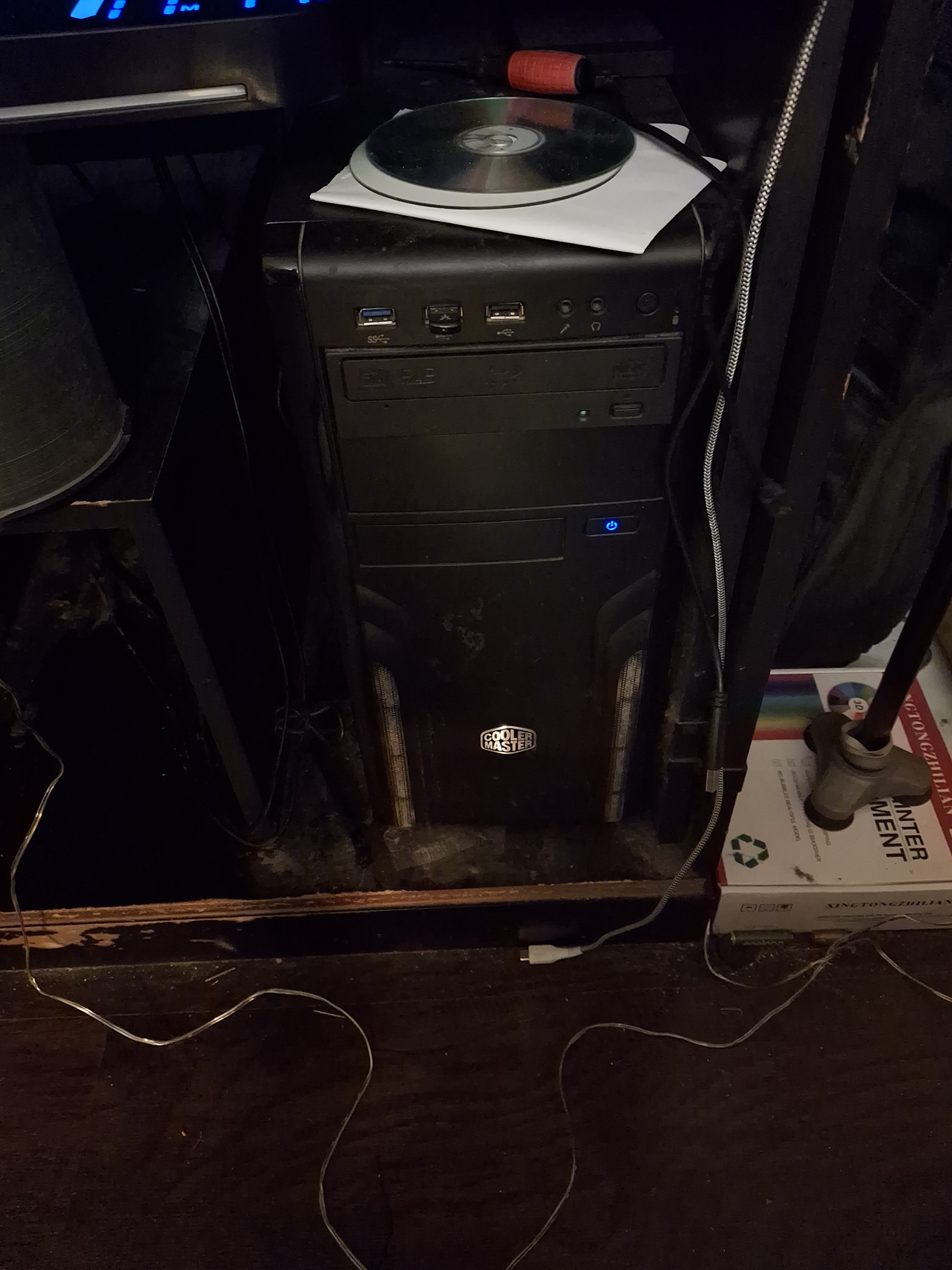
https://lotide.fbxl.net/api/stable/posts/165851/href
My whole empire, made almost entirely of parts scavenged from roadside signs. (not a single fan on the whole setup)
The cable modem is no longer in use, finally got fiber in my neighborhood but the ONT/GW is in the basement. Beelink is my single (for now) proxmox node, HP is running Plex w/ Intel iGPU for transcoding. DS220+ NAS w/ 2x 16TB drives. Unifi switch 8 and USG-3P (fiber ONT/GW passes through to that and it's soon to be replaced with a Palo Alto 410, thanks to work) and then another Unifi 8 port lite in my basement office where the ONT/GW lives. Nothing special, very ugly but I hope to upgrade the wired network to 10g in the future to support a proxmox cluster and my ISPs 5Gbps offering. Also plan on converting my old desktop into an Unraid box since I can get a lot of drives from work and don't really want to stick with the Synology.
